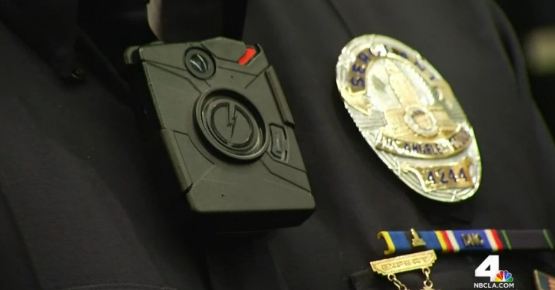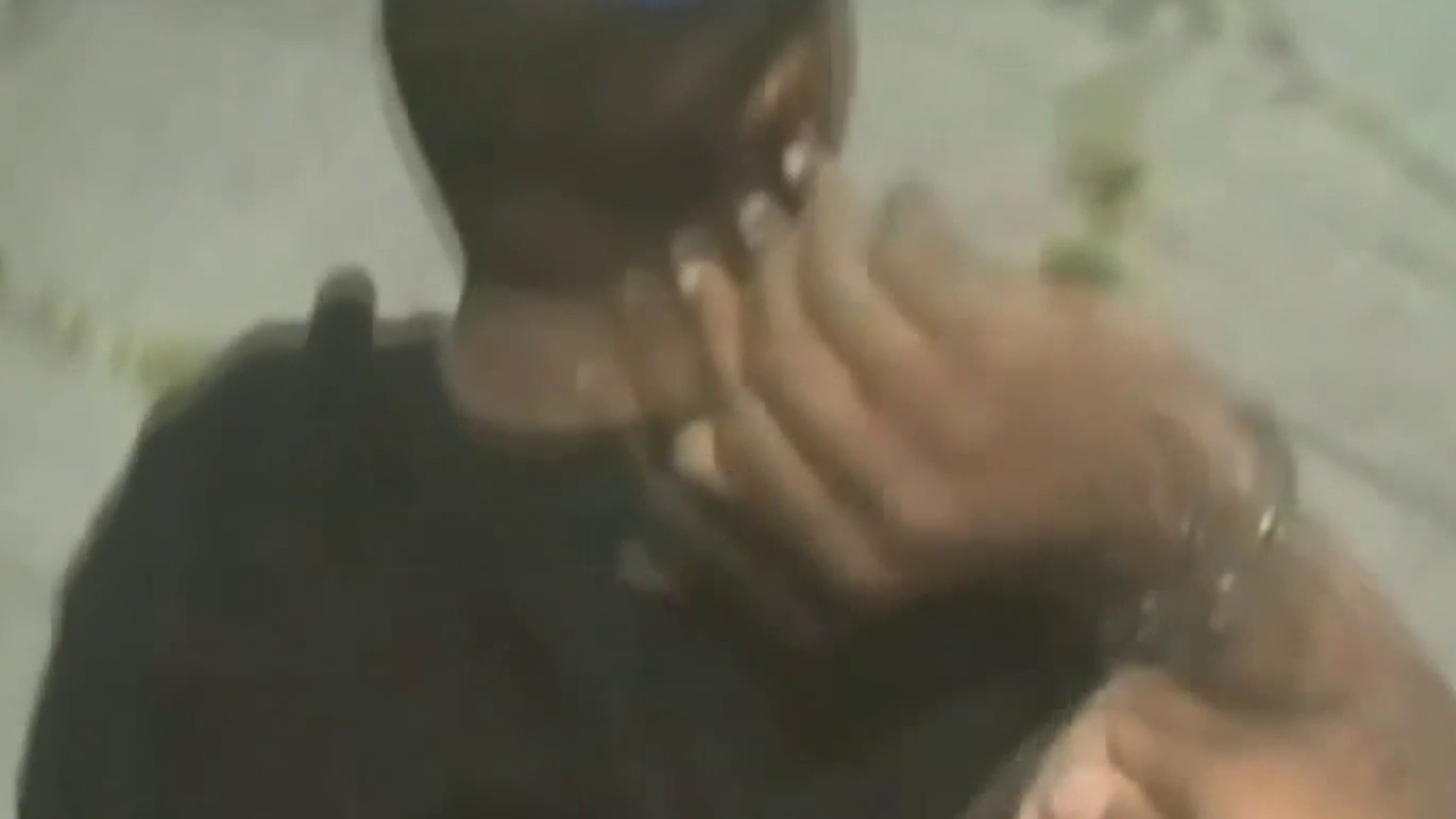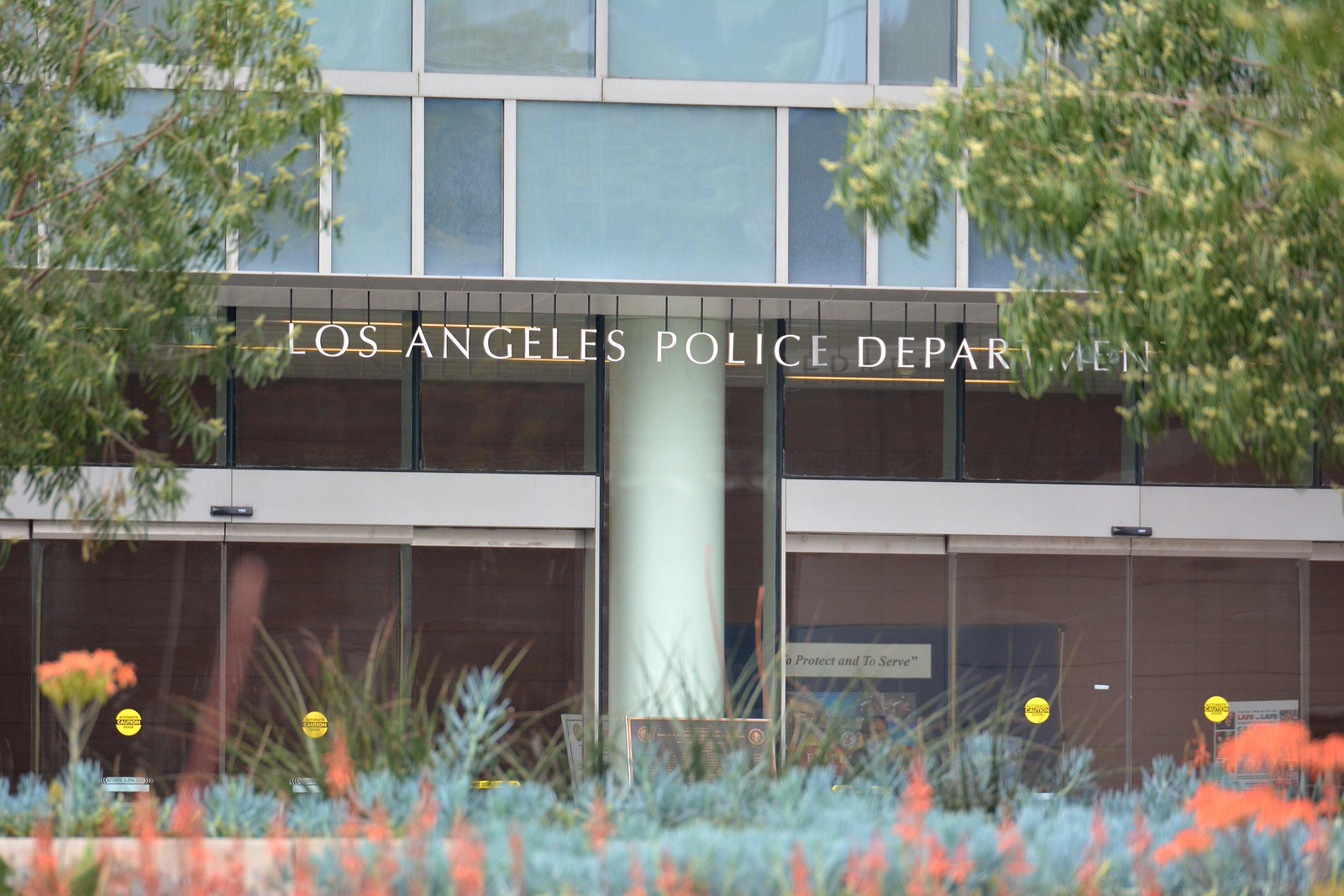The first three LAPD officers accused of filing falsified interview cards that allegedly labeled some innocent pedestrians and motorists as gang members made an initial appearance in court Tuesday but postponed entering pleas to dozens of felony charges.
Officers Braxton Shaw, Michael Coblentz, and Nicolas Martinez attended a hearing in Downtown LA, each wearing face coverings and accompanied by a defense attorney, who together asked for the arraignment to be delayed until December.
The three were charged in a 59-count felony complaint filed in July by the LA County District Attorney's Office.They were fingerprinted, booked, and released on their own recognizance, and had been removed from police work earlier in the year, the LAPD said.
Shaw, Coblentz, and Martinez were the first officers to face criminal charges in a year-long investigation into falsified field interview cards and other police documents that allegedly labeled dozens of innocent drivers and pedestrians as gang members in law enforcement databases, when, in fact, they were not.
Three additional officers were charged earlier this month as part of the same internal investigation, though each faces fewer counts. Officers Rene Braga, Raul Uribe, and Julio Garcia were booked and released on their own recognizance and are due to make an initial appearance in court in early February.
Like Shaw, Coblentz, and Martinez, the three are accused of writing on a field information card that a person admitted being a gang member even though body-worn camera video showed they either never asked the individuals about gang membership or that the people had denied gang membership when they were asked.
Braga is charged with one count each of filing a false police report and preparing false documentary evidence, and could face a maximum of three years and eight months in county jail if convicted as charged. Uribe and Garcia are charged with one count each of preparing false documentary evidence, and could face up to three years in jail if found guilty.
The DA's Office told the I-Team Tuesday it is still considering filing criminal charges against an additional 13 LAPD officers who were also investigated as part of the falsified report case.
All of the officers accused were assigned to the Department's Metropolitan Division when the allegedly false gang reports were made between 2018 and 2019, according to the criminal complaint and other officials.
Last month the District Attorney's Office announced it had begun to drop, or would ask to dismiss, more than a dozen criminal cases connected to the LAPD officers suspected of filing falsified reports.
The criminal cases date back to 2016 and were prosecutions that relied heavily on the accounts of Shaw and Coblentz.
"The Los Angeles County District Attorney's Office has identified cases in which Officers Shaw and Coblentz, who were partners at the time, were the sole percipient witnesses," the DA's Office said in a statement in September.
"Our office is reviewing hundreds of cases - both pending and closed -- to determine whether issues involving the officers' credibility undermines our faith that the totality of the evidence would lead a jury to find the defendants guilty beyond a reasonable doubt of the crimes as charged," the statement said.
Also in September an LAPD officer who said she was unfairly removed from the Metropolitan Division sued. Samantha Fiedler claimed she was transferred and effectively demoted as a result of the investigation into false gang reports that had been submitted by other Metro officers.
Fiedler said that happened around the time NBC4 first revealed that more than a dozen officers were under criminal investigation, suspected of labelling innocent drivers and pedestrians as gang members in law enforcement files.
Fiedler's complaint claims that those false reports, documented on 'field interview cards' turned-in by officers each day, were likely a side-effect of pressure from LAPD commanders on Metro officers to report more contacts with gang members.
"It was all about their numbers of arrests and FI cards. Minimums had to be met," Fiedler says in the complaint.
"At Metro, if an officer went more than a day or two without producing a gang or gun arrest, Command Staff would make it clear that "production"needed to increase. "Production" was, is, and always has been, LAPD Speak for more numbers on your Recap, which means more arrests and FI Cards," according to her lawsuit.
Fiedler's attorney, Matthew McNicholas, did not return a calls for comment.
"Due to the pending litigation we are unable to Comment at this time," LAPD Capt. Stacy Spell said last Month.
The I-Team reported in January that according to multiple law enforcement sources, Metro officers were being pressured by supervisors to produce daily reports with as many gang contacts and gun arrests as possible, and that productivity was tracked with statistics on the number of arrests, number of illegal firearms seized, and other metrics, like the number of gang members questioned.
In July the California Department of Justice revoked access to the LAPD's entries in the state's Cal-Gangs database of gang information, following an audit that found inaccuracies in the LAPD's entries in the system.
Those entries may have resulted in the names of innocent drivers and pedestrians stopped by officers being labeled as gang members in the database.
The California Department of Justice said LAPD entries made up approximately 25-percent of the 78,000 current profiles in the Cal-Gangs system.
"CalGang is only as good as the data that is put into it," Attorney General Becerra said in a prepared statement. "If a quarter of the program's data is suspect, then the utility of the entire system rightly comes under the microscope."
The LAPD's audit of a sample of its officers' entries found problems with the data. While a public report said most of the reviewed entries were accurate, a small percentage appeared to have been fabricated, and other entries made assertions about individuals questioned that could not be verified with body worn video recordings or other evidence.
The LAPD's audit said some officers never submitted gang membership information about individuals they questioned who admitted on-camera to being gang members, and other times individuals denied they were gang members but were reported by officers to have admitted membership.
"The capriciousness leading to someone not documented as a gang member, even when they admitted to being an active gang member to the officer at the time of the encounter, combined with others being documented as a self-admitted gang member when they deny gang membership or were not asked about gang membership invalidates the Database," the LAPD auditors wrote.




